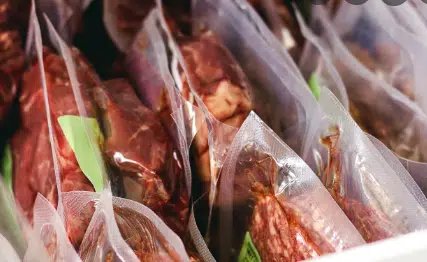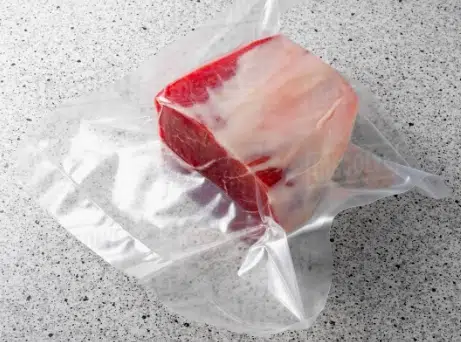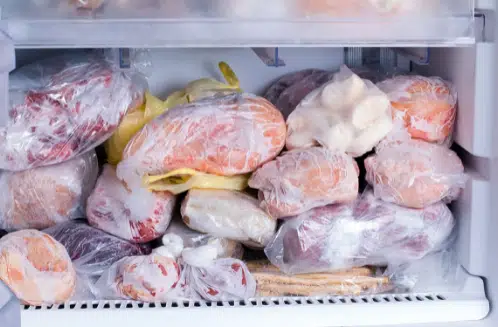Vacuum packing is another excellent way to preserve fresh chicken when stored at refrigerator temperatures. When vacuum packed, the chicken stays fresh and maintains its quality longer than when stored without packaging. Keep reading for more information and answer to how long does vacuum sealed chicken last in the fridge?
A vacuum-sealed chicken will last for one or two weeks in the refrigerator. You can tell if the chicken has spoiled by smell and color as it’s also a good indicator of spoilage. Chicken that has spoiled will have a dark tinge, either creamy yellow to orange or reddish-pink. If you are not sure if it has spoiled or not, do not take the chance! Throw it out.
The shelf life of chicken does depend on several factors, such as the sell-by date, preparation, and storage temperature. If your chicken is vacuum-sealed in airtight plastic, its shelf life will be longer than if it wasn’t vacuum sealed.
How long does vacuum sealed chicken last in the fridge?
 Most of the vacuum-sealed chicken is vacuum-packed with several layers of packaging to extend the shelf life. Vacuum-packaged poultry, like any meat, will stay fresh in the refrigerator for up to 6 months, provided you haven’t frozen it before packaging.
Most of the vacuum-sealed chicken is vacuum-packed with several layers of packaging to extend the shelf life. Vacuum-packaged poultry, like any meat, will stay fresh in the refrigerator for up to 6 months, provided you haven’t frozen it before packaging.
If properly stored, vacuum-packed meats can last three times as long as fresh beef that’s not packaged.
When you seal chicken with a vacuum, it’s best to use it within 3 to 4 months so you don’t have any spoilage. The chicken itself will stay fresh for longer, but the vacuum doesn’t affect the meat as much as it does with other foods like salad and pasta.
Meat vacuum-sealed or frozen will last 2 to 3 times as long as conventional beef, fish, lamb, or poultry at room temperature under ordinary conditions.
To preserve flavor and prevent freezer burn, vacuum seal chicken before freezing. Be sure to freeze only the amount of chicken you’ll need for one meal so that after it’s thawed, it can be cooked.
No products found.
How Long Does Vacuum Sealed Chicken Last in the Freezer
You can freeze a vacuum-sealed chicken in its original packaging, or you can repackage the chicken into smaller portions if you prefer. The longer you keep the chicken in the freezer, the more likely it is that it will pick up odors from other foods in your freezer.
Vacuum-sealed chicken should be stored in the freezer for up to 6 – 12 months, which is a great way to save money and time.
If you vacuum-sealed your chicken, you can keep it in the freezer for up to 12 months. This is because vacuuming removes air from the package, which helps prevent freezer burn and keeps it fresh for longer.
Furthermore, If you want to keep your vacuum-sealed chicken longer, then you should freeze it at 0 degrees Fahrenheit or lower. This will help prevent bacterial growth and keep your meat safe to eat.
Vacuum packed cooked meat shelf life.

Vacuum-packed cooked meat shelf life is longer than ordinary cooked meats, even when they are refrigerated after opening. It is used in the food industry to preserve freshness by removing oxygen, preventing the growth of bacteria from sustaining, and allowing for longer storage time without refrigeration.
Helpful in distributing ready-to-eat meals for military personnel or anyone involved in emergency response.
How to use a vacuum bag for whole chickens

Vacuum sealing is an excellent method to store meat, fish, and other food products. In addition, this method of storage makes for easy packing when you are ready to take your food with you. If you do not have space in your freezer or refrigerator to chill whole chickens, vacuum-sealing them is an excellent way to store them.
By removing the air from plastic bags, you reduce oxidation and prevent bacterial growth. The bags also provide the chicken with an impenetrable barrier that protects it from moisture and bacteria.
Vacuum bags can be a great help in sealing foods before freezing or refrigerating. It is not a substitute for packaging, as the vacuum bag will only keep your meat fresh for longer days when kept in the refrigerator.
How long does vacuum sealed pork last in the freezer
The shelf life of vacuum-sealed pork without any freezer burn is 21 months. This 21-month figure does not mean that your pork will remain fresh and edible for that period. It means that the pork will remain safe to eat during that time. Vacuum sealing your pork in freezer-grade bags with oxygen absorbers typically results in a shelf-life of around 3-5 years, depending on how you handle it during this storage period.
Pork chops in the freezer don’t have to be limited to plain old pork chops. Marinating the pork chops before freezing them will add flavor and extra moisture after removing them from the freezer. This way, they’ll thaw enough to not completely dry out in the pan when you cook with them. A simple marinade of barbecue sauce and pineapple juice works well with most pork chops.
How long does vacuum-sealed chicken last at room temperature?
No products found.
If kept at room temperature, the vacuum-sealed chicken should last for 1 to 4 days. The length of time depends on the age of the chicken, which can range from up to 21 days old, and temperature. Chicken lasts longer at colder temperatures than at room temperature.
It won’t spoil for a month or two, but you can refrigerate vacuum-sealed chicken after one month; it is essential because refrigerating the chicken will slow down the drying of the meat, which can make it too dry if left out at room temperature for too long.
How Long Does Vacuum Sealed Raw Meat Last in the Fridge
How long vacuum-sealed raw meat will last in the fridge depends on various factors, such as when it was packaged and stored, where it was stored and how it was stored. Vacuum sealed raw meat can last 1 to 2 months in the fridge with no harmful bacterial growth. Meat should be stored at the lowest possible temperatures to maintain its freshness.
Meanwhile, the shelf life of vacuum-sealed raw meat past the date stamped on its packaging is six to twelve months, so long as it is stored correctly at 41 to 46 F.
However, cooked meat that needs to be refrigerated should be stored in a container or plastic bag and placed in the bottom of the fridge. While the meat is still warm, bacteria, which germinate at warm temperatures, can multiply and spoil your food. If you increased the fridge’s temperature slightly, this would further inhibit bacterial growth.
Vacuum packing is a great way to preserve the freshness of your meats, whether they’re cuts of beef, lamb, pork, or fish. Your meat will last longer when vacuum-packed than if it were wrapped in plastic wrap.
How Long Does Vacuum Packed Cooked Meat Last
The time for vacuum-packed cooked meat to go bad depends on a variety of factors, such as storage conditions (cool and dry) and the kind of meat (beef has a much longer shelf life than poultry), as well as the type of packaging (regular zipper-locking bags are typically quicker to contaminate).
When stored in a refrigerator, the shelf life of vacuum-packed cooked meat ranges from 7 to 10 days. Vacuum-packed cooked meat products have a longer shelf life if stored at an appropriate temperature and away from heat, sunlight, moisture, and any potential contaminants.
Recommended Post: Can You Freeze Mussels?
How Long Does Vacuum Sealed Chicken Last in the Freezer
You can store vacuum-sealed meat in the freezer for up to 2 years. However, turkey and chicken are both less sensitive to freezer burn than cuts of red meat.
For example, the vacuum-sealed chicken will last longer than prepackaged frozen chicken if they are used. Similarly, freezing large chicken pieces will take up more space and decrease storage time because large pieces will thaw quicker than smaller ones.
Moreover, it’s suggested that poultry be stored in the back of a refrigerator instead of the door to maximize its storage potential.
Benefits of vacuum-sealing food

1. Quality of the food will be maintained
Vacuum sealing is a proven method to preserve the quality and taste of food. When placed inside a vacuum-sealed bag or container, the food will retain its flavor, texture, and nutritional content. Also, the bags are highly durable and recyclable. They are also odor, stain, and taste resistant.
2. Food will stay fresher for extended periods
Fresh food can last up to five times longer than traditional storage methods. Vacuum sealed food will stay fresher for extended periods without any harmful effects on nutrition or taste.
3. Avoid wastage of foods
Vacuum sealing is an efficient way to store food for long periods. The process is straightforward without the wastage of food.
4. Protects meat from freezer burn
It removes the air from the bag. Removing the air means that it won’t contact your food and can’t oxidize or get freezer burnt. By removing all of the air, you get a tight seal that prevents air from penetrating
5. Makes food taste better
Vacuum Sealers preserve foods; food tastes better than regular canned food because it’s fresher. The sealing process also removes the oxygen that speeds up the decomposition of food. Vacuum sealers prolong the shelf life of foods
Disadvantages of vacuum-sealing food
Vacuum sealing food may not be suitable for certain foods such as meat since removing oxygen will cause an anaerobic reaction in the tissues of the food, resulting in unpleasant flavors and textures.
1. An increased growth of anaerobic bacteria will occur when meat is vacuum-sealed and refrigerated for an extended period. Anaerobic bacteria thrive in low oxygen environments, so the conditions are perfect for these bacteria to multiply by removing the oxygen from the sealed pouch. These harmful bacteria can then cause sickness or other food-borne illnesses.
2. This method does not apply to food with very high water content or low melting point. Examples include fresh fish, seafood, lettuce, spinach, tomatoes, etc. You cannot place food like this in a vacuum-sealed bag.
3. Vacuum sealing food is helpful to keep foods for more extended storage. But most vacuum bags are only one-use, so if you want to buy one, go for the one you can reuse. There are some one-use vacuum bags available with re-sealable ziplock tops.
Frequently Asked Questions
Does vacuum-sealed chicken go bad?
Vacuum-sealed chicken can go bad, but it won’t be due to the vacuum sealing. Chicken (and other meats and fish) can become spoiled because of bacterial or fungal growth that happens naturally on or in the meat. The normal shelf life of a vacuum-sealed chicken in the pantry is three to four months when stored under normal temperature conditions.
If you store it in a freezer, the shelf life will extend to about eight months. If stored in the refrigerator, the vacuum-sealed chicken will usually last six to eight weeks.
How long does defrosted vacuum-sealed chicken last in the fridge?
Defrosted vacuum-sealed chicken can be safe for 1-2 weeks in the refrigerator. Or, if you prefer fresh-frozen chicken, we recommend that you cook or freeze it within two days of purchase. Freshness depends on storage temperature, the temperature outside the refrigerator, the length of time in the fridge, and how long you leave it in the defrosted state before being placed back in the fridge.
Can raw chicken last 5 days in the fridge?
Chicken can last up to five days in the refrigerator. As long as it’s defrosted and thoroughly cooked before consumption, a raw chicken will last without a problem for this length of time. Chicken stored for five days is remarkably different from fresh chicken. The texture of the meat becomes dense and juicy, almost like a piece of salmon.
How do you tell if chicken has gone bad?
The best method to know if the chicken has turned bad is to look at its appearance. The uncooked chicken will have a whitish, milky color and a grainy texture. Raw chicken should not have any brown or green outer layer or a slimy appearance. The cutting surface of the chicken should appear dry and clean, meaning other food items haven’t contaminated it. As for the cooked chicken, it should again appear to be dry and free from contaminants.
Conclusion
Vacuum sealing chicken is also an excellent way to store leftovers. If you are the type who likes to cook a large amount of chicken, then you can seal up portions of the cooked chicken for later use. This post has answered all your questions on how long does vacuum sealed chicken last in the fridge. Vacuum packing is a better way to extend the shelf life of your food.
